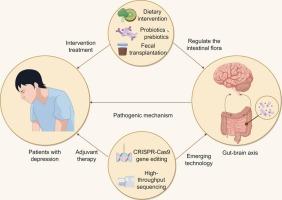Decoding the gut-brain axis in depression: mechanistic insights and functional microbiota-based interventions
IF 4
2区 农林科学
Q2 FOOD SCIENCE & TECHNOLOGY
引用次数: 0
Abstract
The gut-brain axis has emerged as a critical research focus at the intersection of microbiology, nutrition, and neuropsychiatry, underscoring the complex, bidirectional communication between the gastrointestinal tract and the central nervous system. Accumulating evidence suggests that the gut microbiota plays a pivotal role in the development and potential mitigation of depression through multiple physiological pathways. This review systematically summarizes current advances in understanding how the gut microbiota influences depressive symptoms, with particular attention to mechanisms involving neurotransmitter metabolism, immune system modulation, and hypothalamic-pituitary-adrenal axis regulation. Additionally, the microbial production of neuroactive metabolites and the signaling roles of short-chain fatty acids, indoles, and bile acid derivatives in mood regulation were discussed. The bidirectional nature of gut-brain communication is further explored through the lens of microbial-host interaction, emphasizing how probiotics, prebiotics, and microbial biomarkers modulate gut-brain signaling pathways. Finally, the review outlines emerging strategies and future directions in microbiota-targeted interventions for depression, providing a scientific basis for the development of functional food approaches in mental health management.

解码抑郁症的肠-脑轴:机制见解和基于功能微生物群的干预
肠脑轴已成为微生物学、营养学和神经精神病学交叉领域的一个重要研究焦点,它强调了胃肠道和中枢神经系统之间复杂的双向交流。越来越多的证据表明,肠道微生物群通过多种生理途径在抑郁症的发展和潜在缓解中起着关键作用。这篇综述系统地总结了肠道微生物群如何影响抑郁症状的最新进展,特别关注涉及神经递质代谢、免疫系统调节和下丘脑-垂体-肾上腺轴调节的机制。此外,还讨论了微生物产生的神经活性代谢物以及短链脂肪酸、吲哚和胆汁酸衍生物在情绪调节中的信号作用。通过微生物-宿主相互作用的镜头进一步探索肠-脑通信的双向性质,强调益生菌,益生元和微生物生物标志物如何调节肠-脑信号通路。最后,综述概述了以微生物群为目标的抑郁症干预的新策略和未来方向,为功能性食品方法在心理健康管理中的发展提供科学依据。
本文章由计算机程序翻译,如有差异,请以英文原文为准。
求助全文
约1分钟内获得全文
求助全文
来源期刊

Journal of Functional Foods
FOOD SCIENCE & TECHNOLOGY-
CiteScore
9.60
自引率
1.80%
发文量
428
审稿时长
76 days
期刊介绍:
Journal of Functional Foods continues with the same aims and scope, editorial team, submission system and rigorous peer review. We give authors the possibility to publish their top-quality papers in a well-established leading journal in the food and nutrition fields. The Journal will keep its rigorous criteria to screen high impact research addressing relevant scientific topics and performed by sound methodologies.
The Journal of Functional Foods aims to bring together the results of fundamental and applied research into healthy foods and biologically active food ingredients.
The Journal is centered in the specific area at the boundaries among food technology, nutrition and health welcoming papers having a good interdisciplinary approach. The Journal will cover the fields of plant bioactives; dietary fibre, probiotics; functional lipids; bioactive peptides; vitamins, minerals and botanicals and other dietary supplements. Nutritional and technological aspects related to the development of functional foods and beverages are of core interest to the journal. Experimental works dealing with food digestion, bioavailability of food bioactives and on the mechanisms by which foods and their components are able to modulate physiological parameters connected with disease prevention are of particular interest as well as those dealing with personalized nutrition and nutritional needs in pathological subjects.
 求助内容:
求助内容: 应助结果提醒方式:
应助结果提醒方式:


